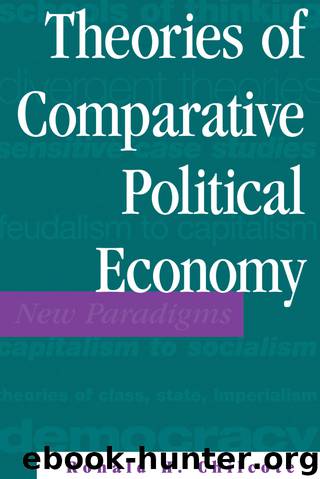Theories of Comparative Political Economy by Chilcote Ronald H.;

Author:Chilcote, Ronald H.;
Language: eng
Format: epub
Publisher: Routledge
ISSUES OF STATE THEORY
An interesting point raised by Jessop is that although critics acknowledge that Marx did not systematically develop a theoretical analysis of the state, they also recognized that other classical Marxist writings rarely focus on state power, capital accumulation, and the changing forms of the state (1990: 25). Table 4.5 not only incorporates these aspects but also serves to extend our discussion on contemporary lines of thinking by emphasizing major issues to consider.
Building on classical Marxist thought, Carnoy and Jessop have identified the principal contemporary currents of progressive thought on the state. First, they point to the emphasis in Ralph Miliband (1969) on an instrumentalist view of the state as a means of attacking liberal theories of pluralism and democracy, an approach that did not advance theory on the state because "he actually reproduces the liberal tendency to discuss politics in isolation from its complex articulation with economic forces" (Jessop 1990: 30). Carnoy also introduces the view of William Domhoff that the capitalist class dominates the state with its economic power and state personnel participate in the dominant class.
Second, there is opposition to instrumentalism as represented in the work of Nicos Poulantzas and an emphasis on the structurally determined role of the state and its complex of social relations in which class struggle occurs not only in civil society but also within the state. Carnoy and Jessop both argue that in this formulation it is not clear whether any class actually controls the state apparatus and, furthermore, that Poulantzas vacillates between a state that is completely independent and a state that is dependent on the economic base.
Third, theorists who follow in the Ricardian tradition emphasize how the state intervenes in the economy to influence distribution of income between classes and ensure corporate profit at the expense of wages; here, says Jessop, the approach ignores social relations of production and class struggle in its attention to struggles for income distribution, and the state is seen as a third force capable of intervention or subject to manipulation.
TABLE 4.5 Contemporary Progressive Theories of the State
Carnoy Jessop
State personnel are one and same as those located in higher branches of government who belong to the same class or classes that dominate civil society (Domhoff) State power built on socialization into the ideology of the dominant class, with attention to instrumentalism in an exposé of the mystification of liberal pluralism (Miliband)
Capitalist class dominates state with its overall economic power, withholding capital, for instance State viewed as a complex of social relations, cohesive and relatively autonomous (Poulantzas)
State is instrument of the ruling class (Miliband, in a qualified way) State influence on the distribution of income between classes and state intervention to ensure corporate profits at the expense of wages (neo-Ricardians)
State as autonomous; no class has power to rule through the state in particular instances {exceptional state) (Poulantzas and Althusser) State monopoly capitalism based on the laws of motion of capitalism; the class nature of the state depends on external factors
State theory derived from economic laws
Download
This site does not store any files on its server. We only index and link to content provided by other sites. Please contact the content providers to delete copyright contents if any and email us, we'll remove relevant links or contents immediately.
| Arms Control | Diplomacy |
| Security | Trades & Tariffs |
| Treaties | African |
| Asian | Australian & Oceanian |
| Canadian | Caribbean & Latin American |
| European | Middle Eastern |
| Russian & Former Soviet Union |
The Secret History by Donna Tartt(19052)
The Social Justice Warrior Handbook by Lisa De Pasquale(12187)
Thirteen Reasons Why by Jay Asher(8893)
This Is How You Lose Her by Junot Diaz(6877)
Weapons of Math Destruction by Cathy O'Neil(6265)
Zero to One by Peter Thiel(5786)
Beartown by Fredrik Backman(5737)
The Myth of the Strong Leader by Archie Brown(5499)
The Fire Next Time by James Baldwin(5431)
How Democracies Die by Steven Levitsky & Daniel Ziblatt(5215)
Promise Me, Dad by Joe Biden(5141)
Stone's Rules by Roger Stone(5081)
A Higher Loyalty: Truth, Lies, and Leadership by James Comey(4954)
100 Deadly Skills by Clint Emerson(4921)
Rise and Kill First by Ronen Bergman(4779)
Secrecy World by Jake Bernstein(4741)
The David Icke Guide to the Global Conspiracy (and how to end it) by David Icke(4708)
The Farm by Tom Rob Smith(4502)
The Doomsday Machine by Daniel Ellsberg(4484)
